READ THE OFFICIAL OWNER'S MANUAL HERE.
Strymon's description of the Strymon Iridium amp modeler and impulse response cabinet pedal
The Amps We've Always Wanted.
Round Amp
Punch Amp
More Examples
What Is Matrix Modeling™?
Amp Science
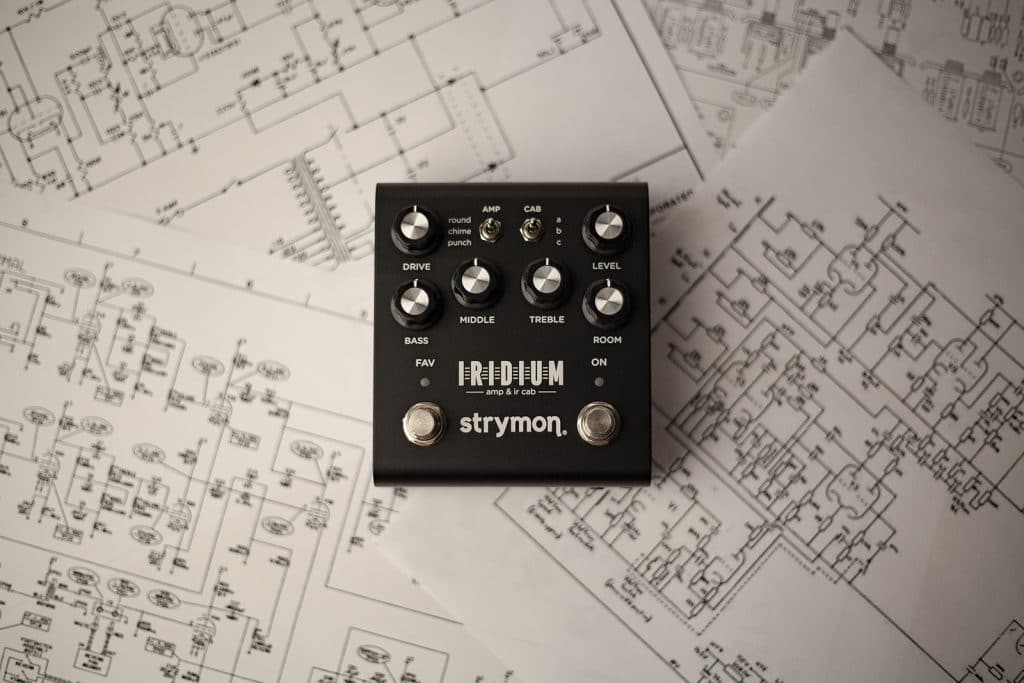
Our Matrix Modeling™ process captures all the subtleties and unique character of each amplifier.
From the unique composition of each tone stack, to component values, bias levels, corner frequencies, and tube stage gain; all of these factors affect the way a note or chord reacts and evolves over time, and all have been mathematically modeled with the highest fidelity.
We included multi-stage power sag, so that the sag response and time constant for each stage of the amplifier is modeled separately, adding further harmonic complexity and realistic feel.
We also modeled the compression, limited cone movement, and speaker distortion that can happen at high signal levels.
We carefully set the range and taper for each knob to make it easy to dial in a variety of great tones with intuitive, predictable amp-like responsiveness.
Combining the meticulous reproduction of original circuits with careful fine-tuning has resulted in three stellar amp models that deliver the response, feel, and inspiring experience of playing through the original amps at their best.
Tone Stacks
Tone Stacks That Hit All The Sweet Spots
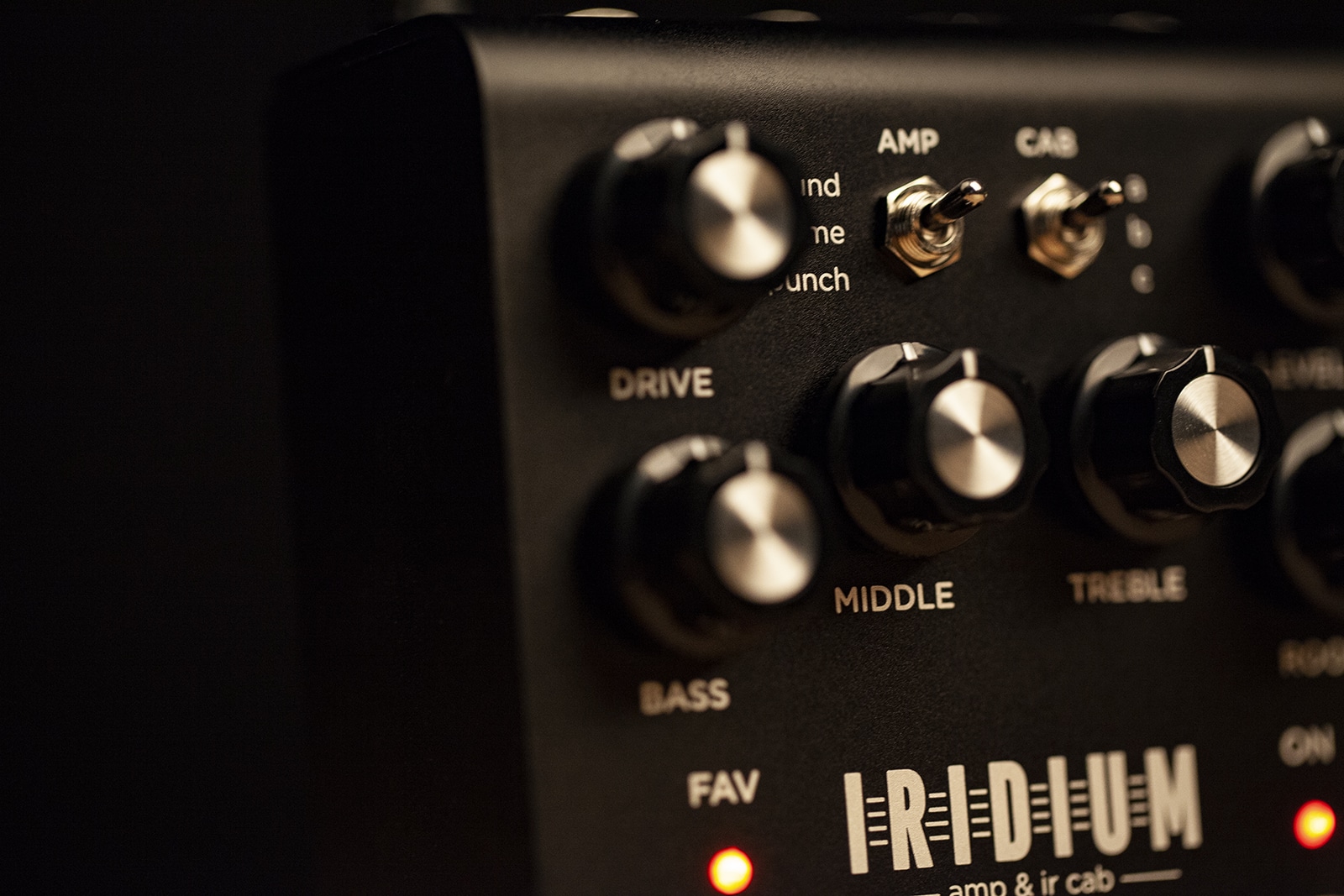
Aggressively boost the treble, and Iridium beautifully reveals all the subtle nuances of even the softest finger-style playing.
Crank the bass, and enjoy resonant low end that will make you swear there’s an amp in the room even when monitoring through headphones.
True to the tone stacks of the classic amps we modeled, Iridium’s tone controls have the same interdependence as found in the original circuit designs.
Iridium gives you amp EQ that is a joy to use, yielding a wide variety of great tones in any direction you go.
A Carefully Curated Cabinet Collection.
Included Cabinets
Nine Stunningly Realistic Cabs.
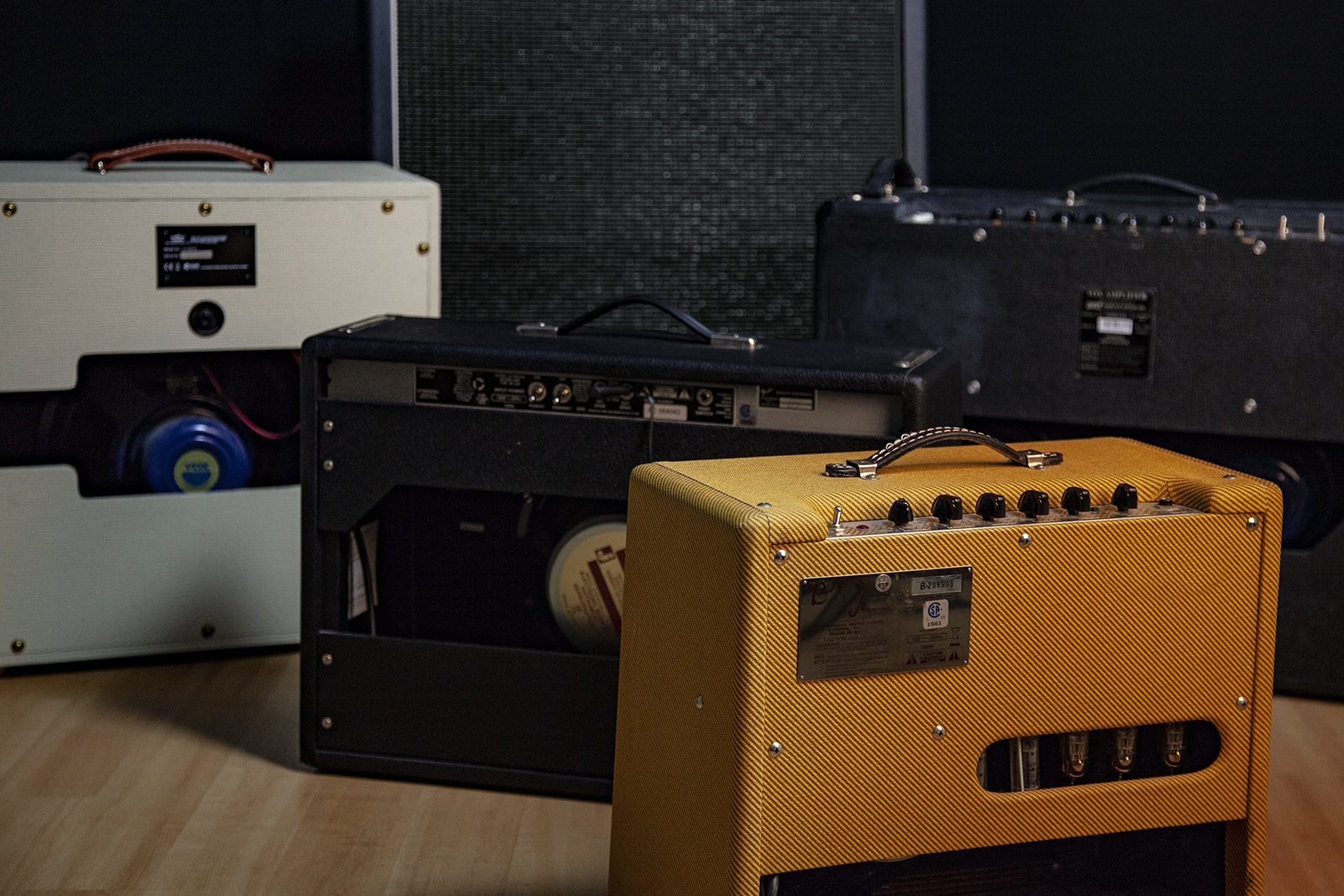
Iridium comes pre-loaded with a carefully curated collection of premium cabinet IRs from OwnHammer, Celestion, cabIR and Valhallir.
You can also load your own IRs using Strymon Impulse Manager software.
Deluxe Reverb® 1×12″ by OwnHammer
Impulse of a vintage Fender® Deluxe Reverb 1×12″ open back combo with a 1978 Fender CTS ceramic 12″ speaker.
Blues Junior® 1×12″ by cabIR
Impulse of a 1×12″ Blues Junior cabinet with a Jensen® C12N speaker.
Vibrolux® 2×10″ by cabIR
Impulse of a 1965 Fender Vibrolux 2×10″ with Jensen C10NS speakers.
AC30 2×12″ AlNiCo by OwnHammer
Impulse of a Vox® AC30/6 open back 2×12″ combo with 2001 Celestion® T0530 Blue AlNiCo speakers.
1×12″ AlNiCo by Celestion
Impulse of a Celestion Blue AlNiCo speaker in a closed back 1×12″ cab.
Mesa® 4×12″ by Valhallir
Impulse of a 4×12″ Mesa Boogie halfback with two Celestion Black Shadow® MC-90 and two ElectroVoice® Black Shadow EVM12-L speakers.
GNR 4×12″ by OwnHammer
Impulse of a 1971 Marshall® 1960B “basketweave” 4×12″ cabinet with 1971 Celestion T1221 G12M-25 speakers.
2×12″ Vintage 30 by Celestion
Impulse of a Celestion Vintage 30 in an open back 2×12″ cab.
Marshall 8×12″ AlNiCo by cabIR
Impulse of a 1965 Marshall 8×12″ re-issue full stack cabinet, with Celestion T652 AlNiCo speakers.
Impulse Response Technology
Unprecedented IR Technology.
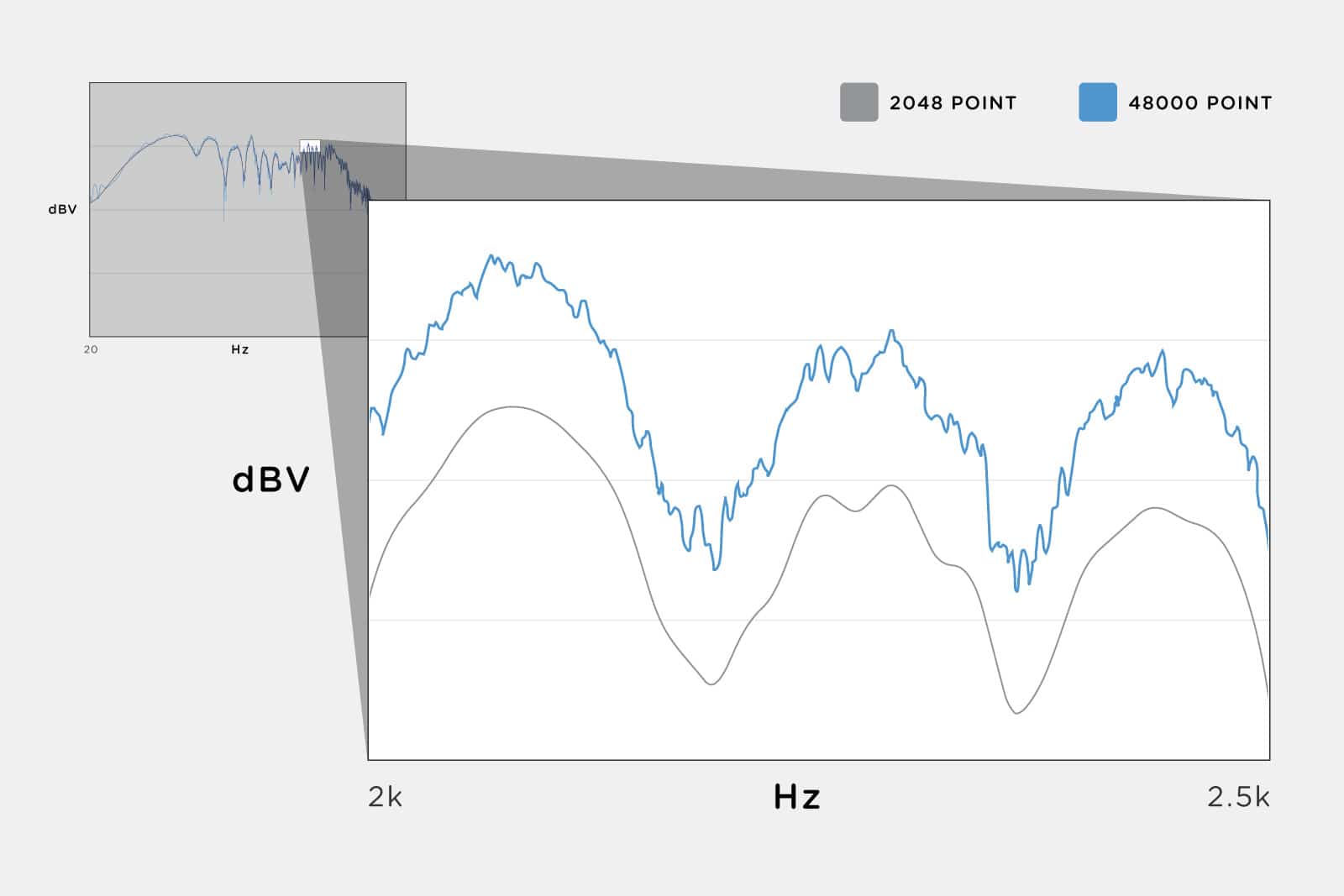
Image caption: More points equal far greater detail and realism than any other hardware IR device.
Impulse responses allow the sound and character of a mic’d speaker cabinet to be captured, so that any audio signal can be processed by the resulting impulse response and sound as if it’s being played through that exact speaker cabinet.
Iridium is able to deliver impulse response resolution far greater than any other piece of outboard gear.
With full 24bit 96kHz resolution for the entire 500 milliseconds of its speaker cabinet impulse responses, Iridium is able to use the absolute highest quality IRs available.
This means countless details are accurately preserved and reproduced to give you a completely real speaker response.
Every cabinet resonance, speaker vibration, as well as reflections between the cabinet, the mic, the floor, and the ceiling; all the minuscule cues that tell our brain we are listening to our favorite cabinet are preserved, providing completely lifelike realism.
Load Your Own Impulses
Load Your Own Impulses.
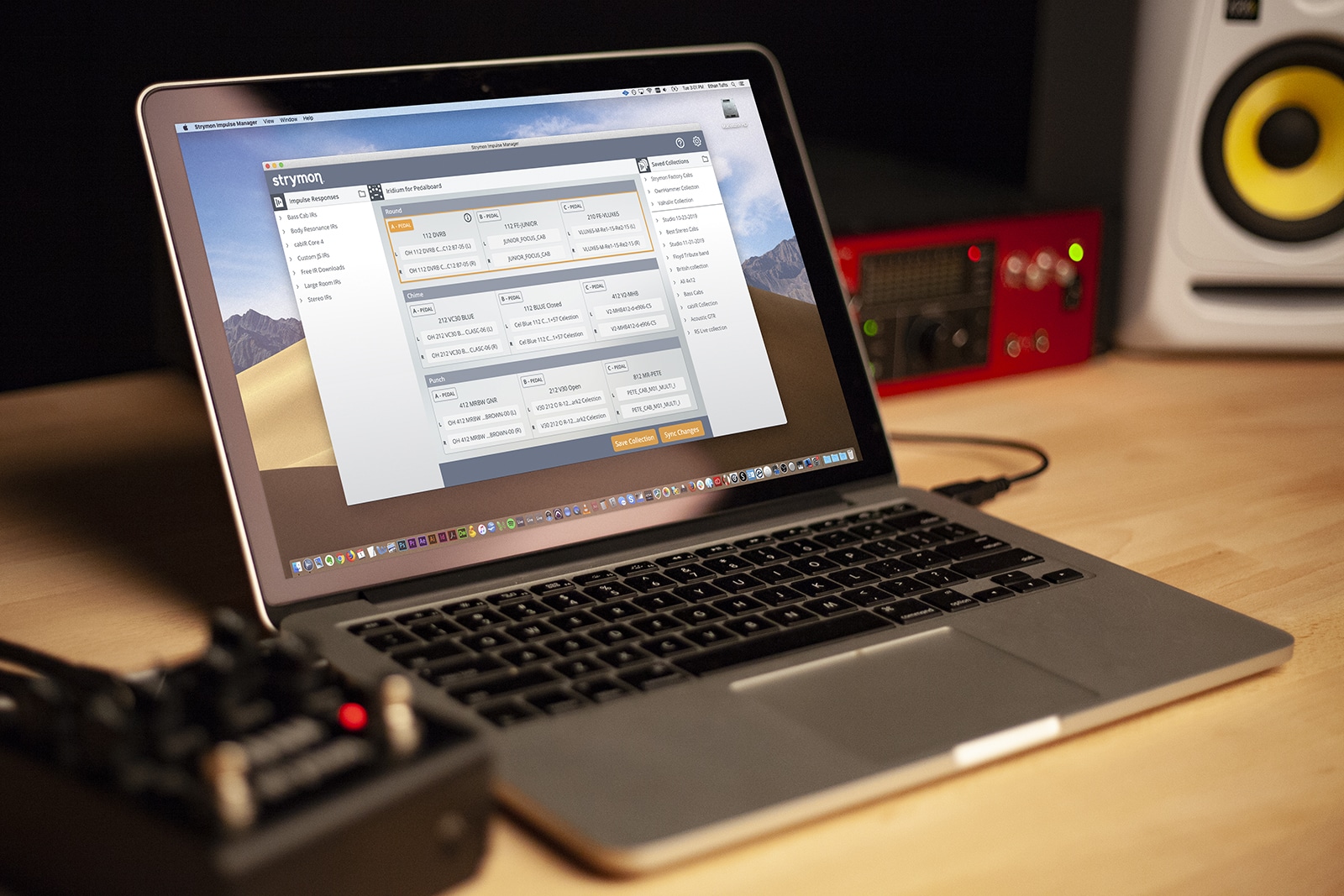
It’s easy to replace the pre-installed IRs with custom IRs from your own collection by using Strymon Impulse Manager software.
To download the software or learn more, visit Iridium support page.
Where Can I Use Iridium?
On Stage
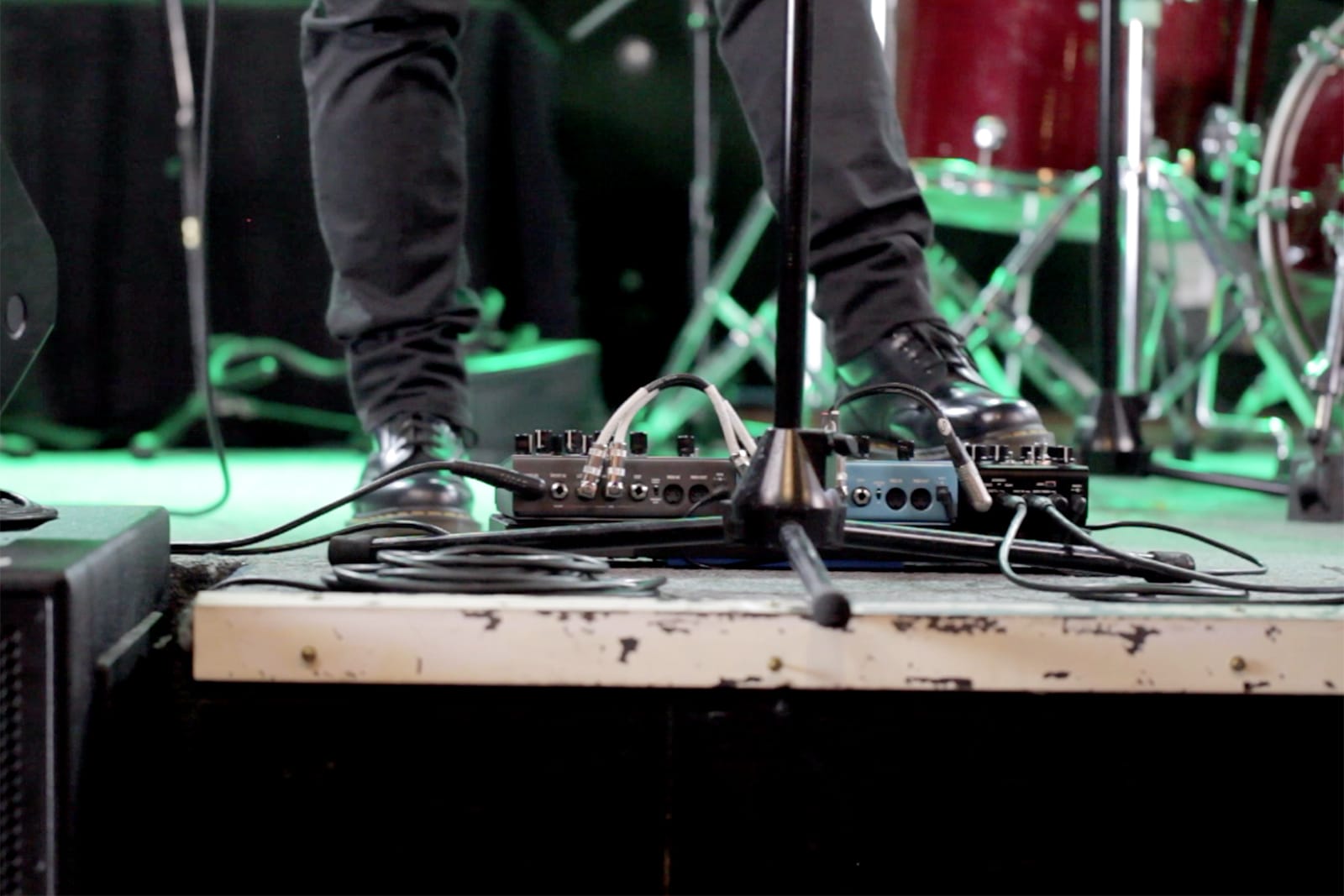
Want to play live with the exact same tones that you use at home or in the studio?
Or have access to multiple amp and cab setups without having to lug them on stage?
Leave your amps at home, and connect Iridium directly to the house PA system.
Going direct eliminates the need to mic an amp, giving sound engineers the option to send your amp and cab tone directly to a wedge or in-ear monitors.
Instant adjustments to your tone are right there on your pedalboard, only a footswitch away. With Iridium, there are no menus to wade through—just familiar, responsive amp-style controls for instant, easy adjustment.
In the Studio
Iridium provides gorgeous, iconic amp tones, stunningly realistic stereo cabinet impulse responses, and natural room ambience—essential elements for recording guitar in the studio.
Place Iridium at the end of your effects chain and capture stereo amp and cab tones direct into your recording interface.
Or, place Iridium before your delays and reverbs to allow those time-based effects to occur post amp and cab.
Skip the hassle of miking up your amps or having to crank them up to get the tone you desire. Instantly audition amps and cabs with the flick of a switch.
At Home
You can’t always crank up an amplifier when you want to play in your living room or rehearse at home.
Plug your favorite set of headphones into Iridium’s headphone jack and get immersed in the sounds of iconic amps and cabs in a natural sounding room.
Integrate Iridium into your pedalboard by placing at the end of your chain and experience your entire pedalboard tones directly in your headphones.
More Use Cases
Iridium also allows for less common use cases.
Want to use Iridium’s amplifiers but not the IR cabinets? Select Iridium’s Cab Bypass mode, and connect the output(s) to the effects return or power amp input on a guitar amplifier.
Want to use Iridium’s IR cabinets but not the amps? Engage Iridium’s Amp Bypass mode, and connect a preamp or preamp pedal (such as Riverside) to Iridium’s input.
Because the purpose of Iridium is to generate amp and cabinet tones, the primary use case is for direct situations.
It’s not recommended to connect Iridium to a guitar amplifier.
More Features
Room Ambience
An Amp, Through a Cab, in a Room.

Iridium features a hybrid room ambience design that combines 256ms impulse response captures of real rooms for realistic early reflections, with an algorithm for extended decay and modulation.
This combination places your amp and cab in a natural sounding room, creating a real space for your amp to open up and breathe.
In addition to controlling the amount of room ambience, you can also choose a small, medium, or large room.
Analog JFET Front End
Super Quiet, Amazingly Responsive.
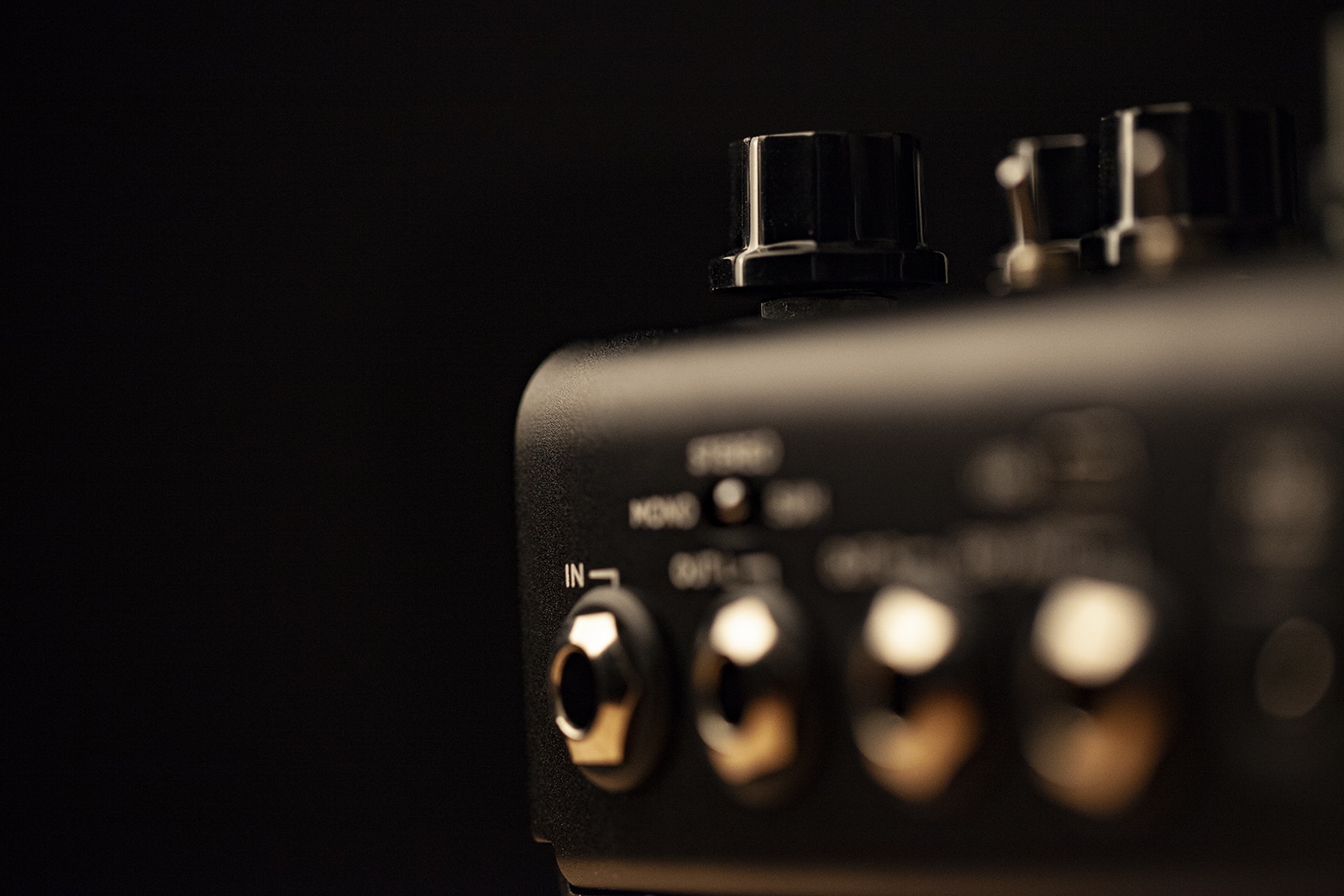
Iridium’s input features an ultra low noise, discrete, class-A JFET preamp circuit providing up to 20dB of pure analog gain.
This variable gain JFET circuit is used in concert with DSP to create the tube driven input stage of each of Iridium’s amps.
With our hybrid approach you get the best of both analog and digital worlds. The JFET stage acts as an analog front end conditioner, providing exceptional touch sensitivity and dynamic interaction with your guitar while improving noise performance, and the incredibly powerful SHARC DSP facilitates the great level of detailed complexity and responsiveness of each tube amp’s circuitry.
This combination of variable gain JFET and DSP is also how we are able to deliver that hot-rodded extra gain at the top end of the Drive knob for the Chime and Punch amps.
Stereo Operation
Stereo Through and Through.
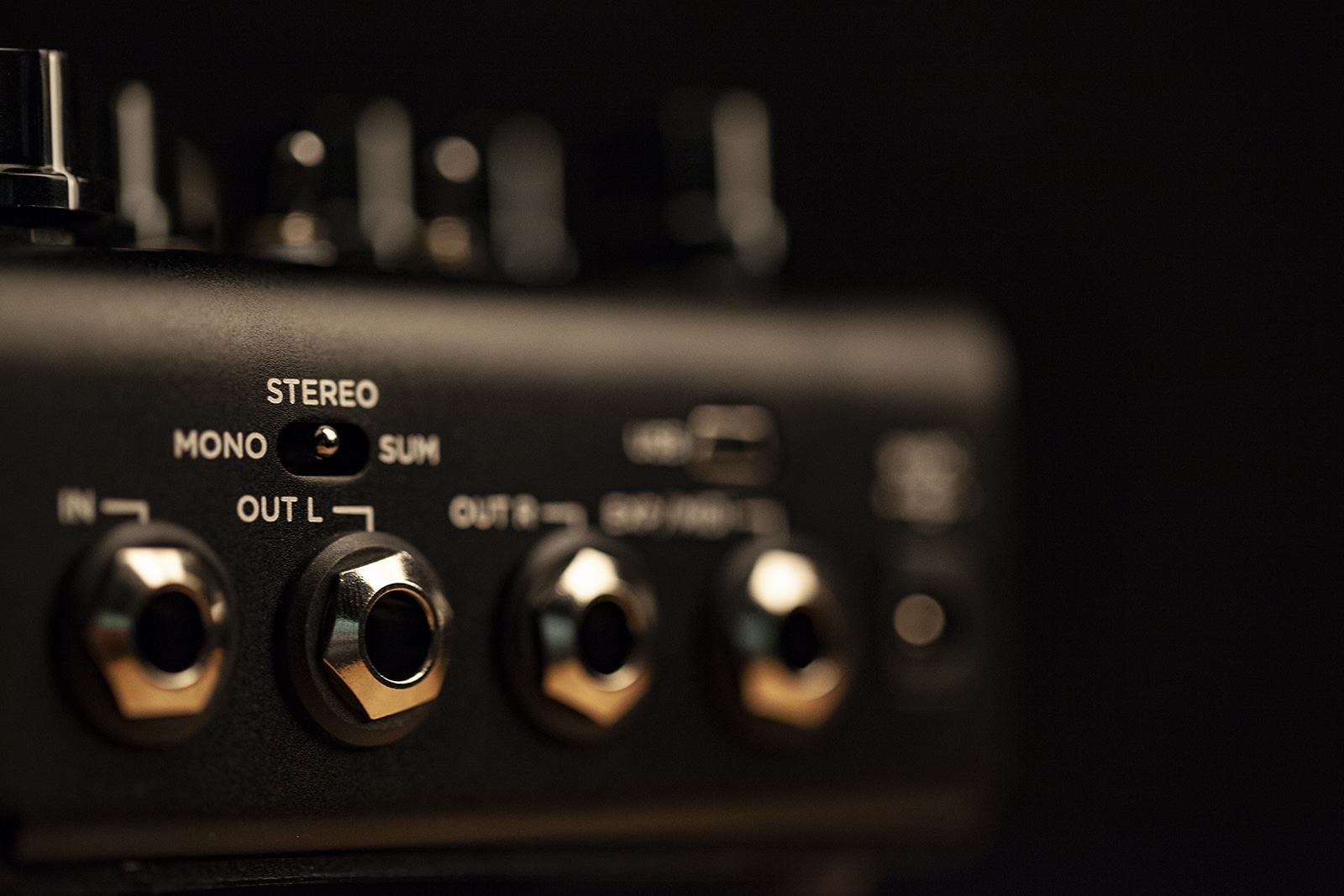
Iridium is perfect for use with stereo effects in stereo rigs.
Iridium’s TS-mono/TRS-stereo input features stereo class-A JFET preamps feeding into a stereo amp driving a stereo speaker cabinet in a stereo-captured room feeding stereo outputs.
Headphone Out
Get Immersed.

You can’t always crank up an amplifier when you want to play in your living room or rehearse at home.
Plug your favorite set of headphones into Iridium’s headphone jack and get immersed in the sounds of iconic amps and cabs in a natural sounding room.
Presets
Everyone Has a Favorite.

Iridium allows you to save and recall your favorite settings.
Simply dial up your favorite sound, and press and hold the Favorite switch to save these settings.
Instantly recall these settings with the press of the Favorite switch, or press again to return back to the current knob and switch settings.
Or, connect a MultiSwitch Plus to give you access to 4 presets right at your feet. You can also connect a MIDI device to access up to 300 presets.
MIDI Control
Hidden Superpower.
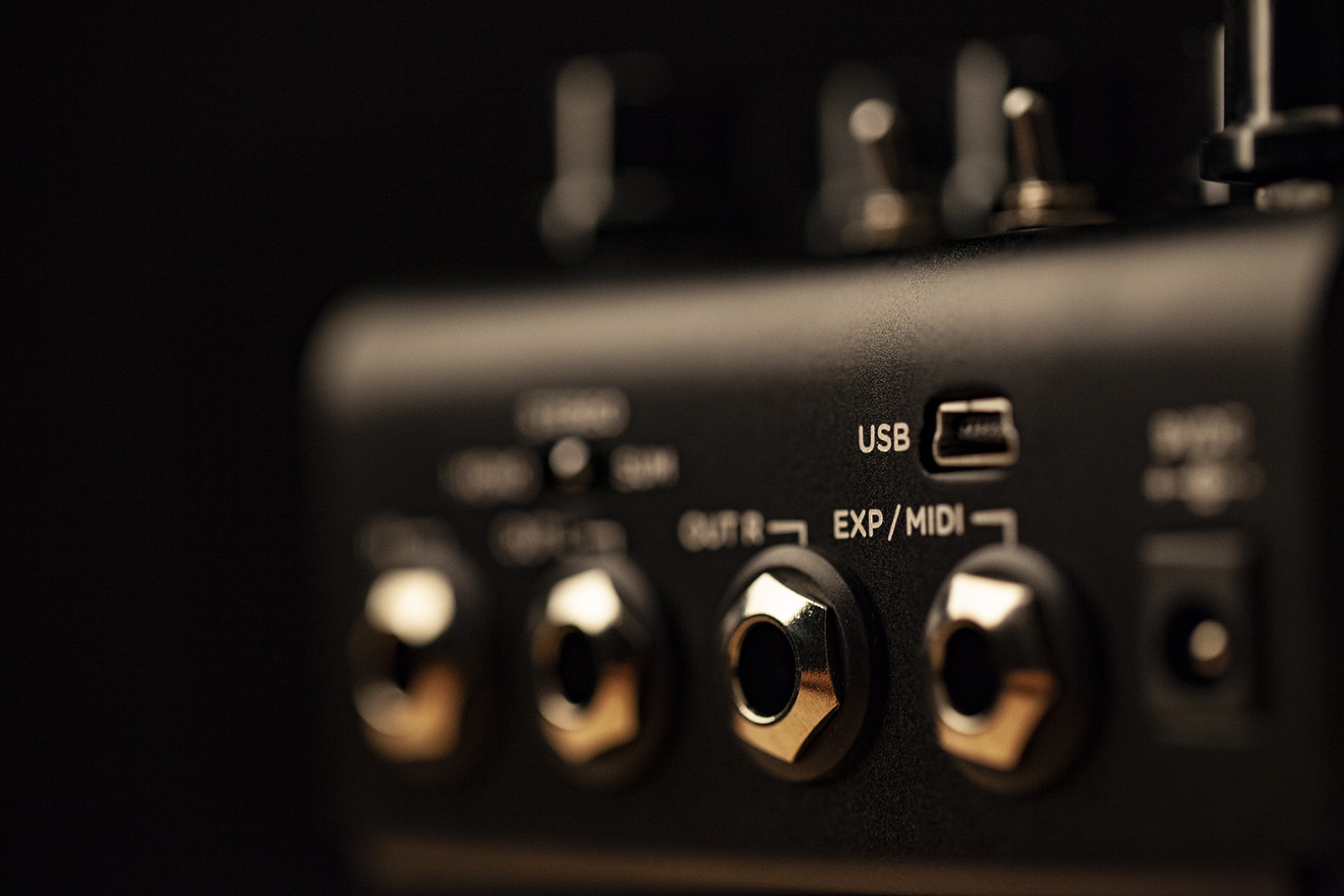
Lurking inside your Iridium pedal is a hidden superpower: MIDI Control.
Save and load presets with up to 300 preset locations. Control all knobs and switches via MIDI.
Integrate Iridium into an elaborate MIDI pedalboard or use in an ultra-compact setup for easy travel.
Expression
Powerful Expression Control.
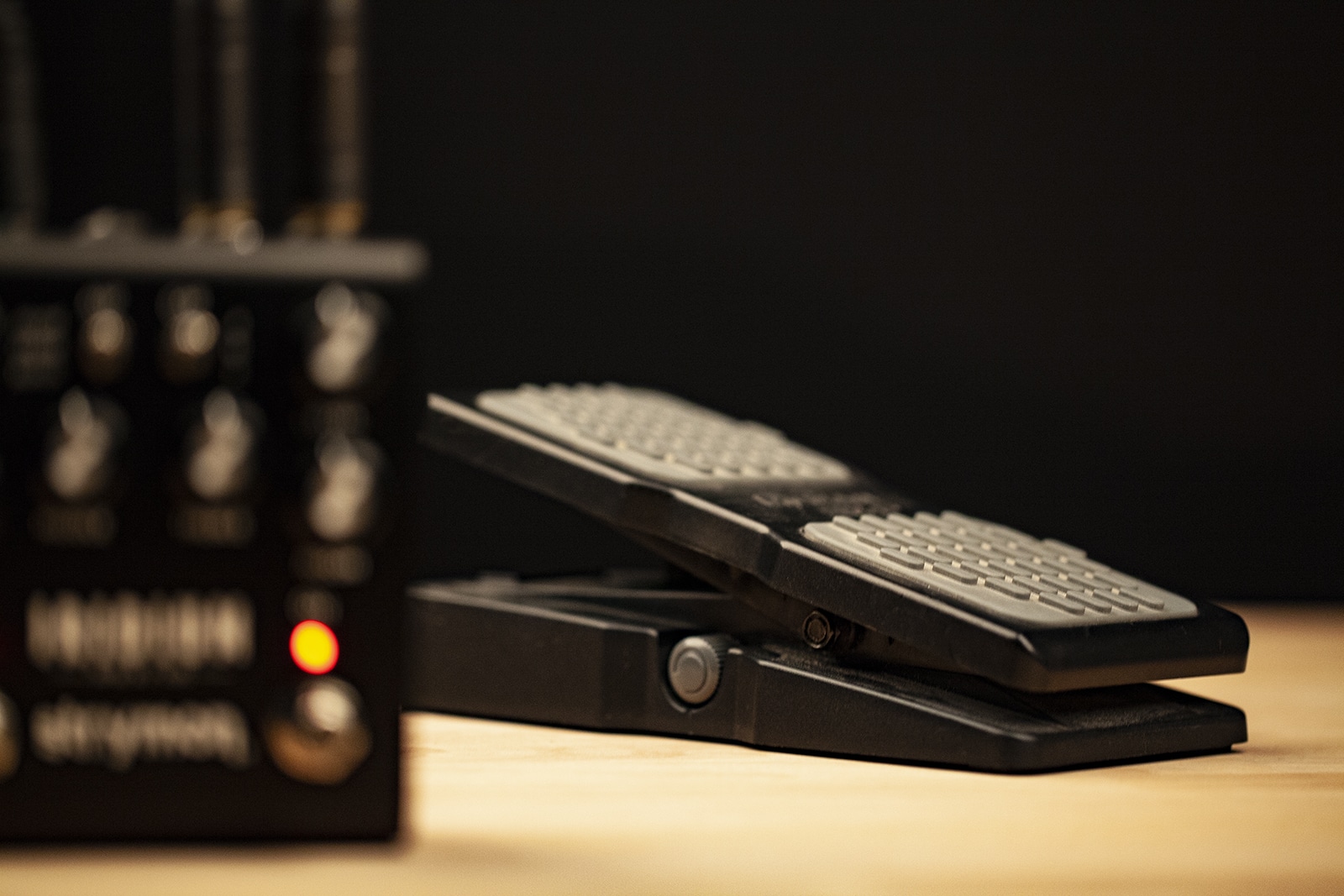
With Volume Mode, you can connect an expression pedal and use it as a Volume pedal, providing a logarithmic taper for smooth volume control.
This provides an excellent alternative to a standalone volume pedal.
Volume can be set for pre or post amp, cab, and room settings.
Or, use your expression pedal to enjoy a whole new level of instantaneous, continuous control.
Set as many knobs as you like for the heel position and toe position of your expression pedal, and all settings will simultaneously morph throughout the full range of the expression pedal.
Design
Amp Research & Development
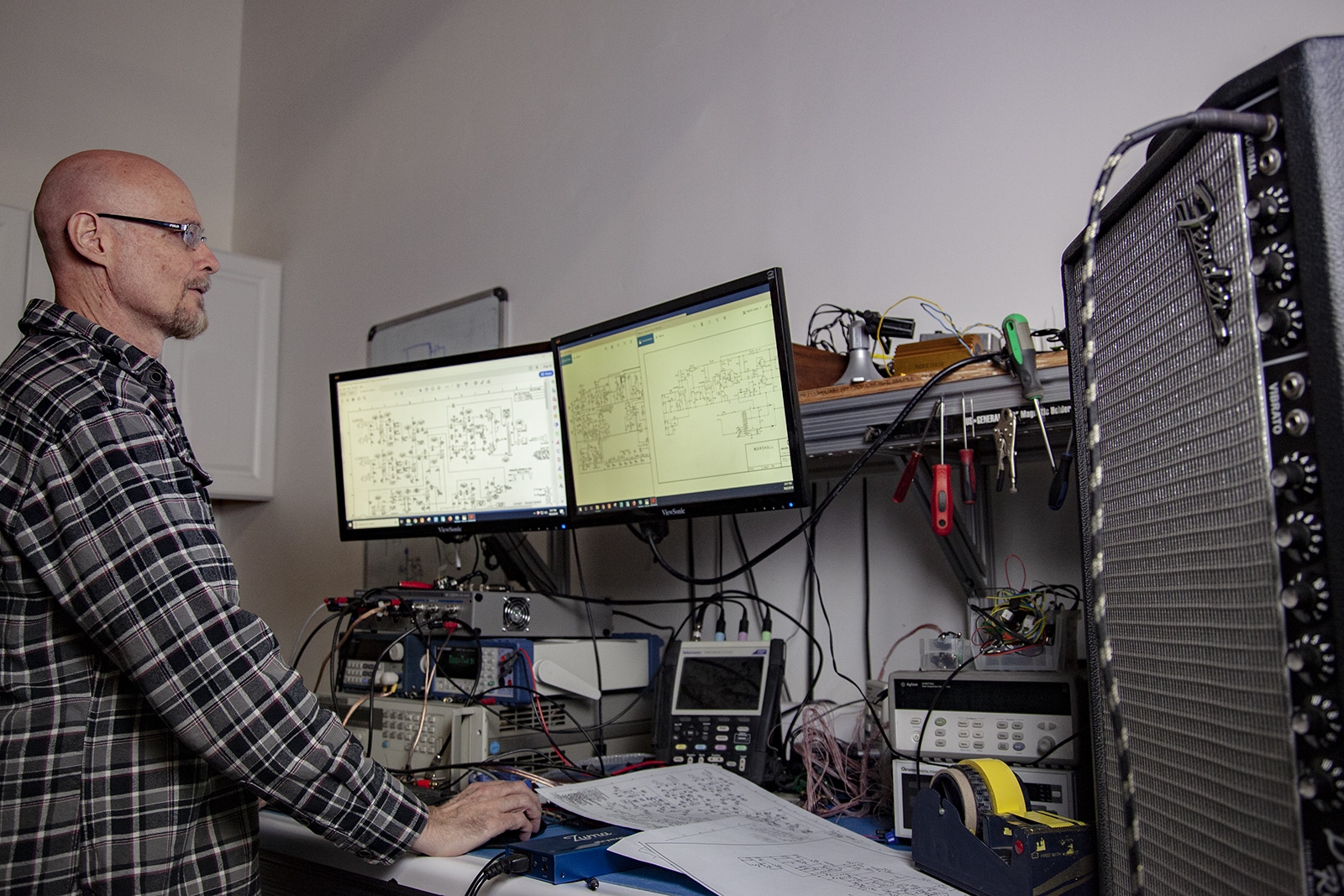
Delivering the complete experience of playing into an amp through a miked cab in a room is a research and development project that has been years in the making.
The amp development began in the tube emulation and cascading gain stage topography created for Riverside, and then majorly leveled up for the intense degree of real-time calculation Matrix Modeling™ required to create Iridium’s amps.
We’re not just talking about the perfectly recreated tone stacks, but also things like the treble bleed on the gain controls, multi-stage power supply sag, and preamp and power amp tube emulation.
Our talented and tireless engineering team covered quite a bit of new ground on the way to recreating these classic amp designs with exact mathematical fidelity, and then expanded the capabilities of each amp in musically useful ways, giving you the full range of original amp sounds, and then some.
Impulse Response Technology
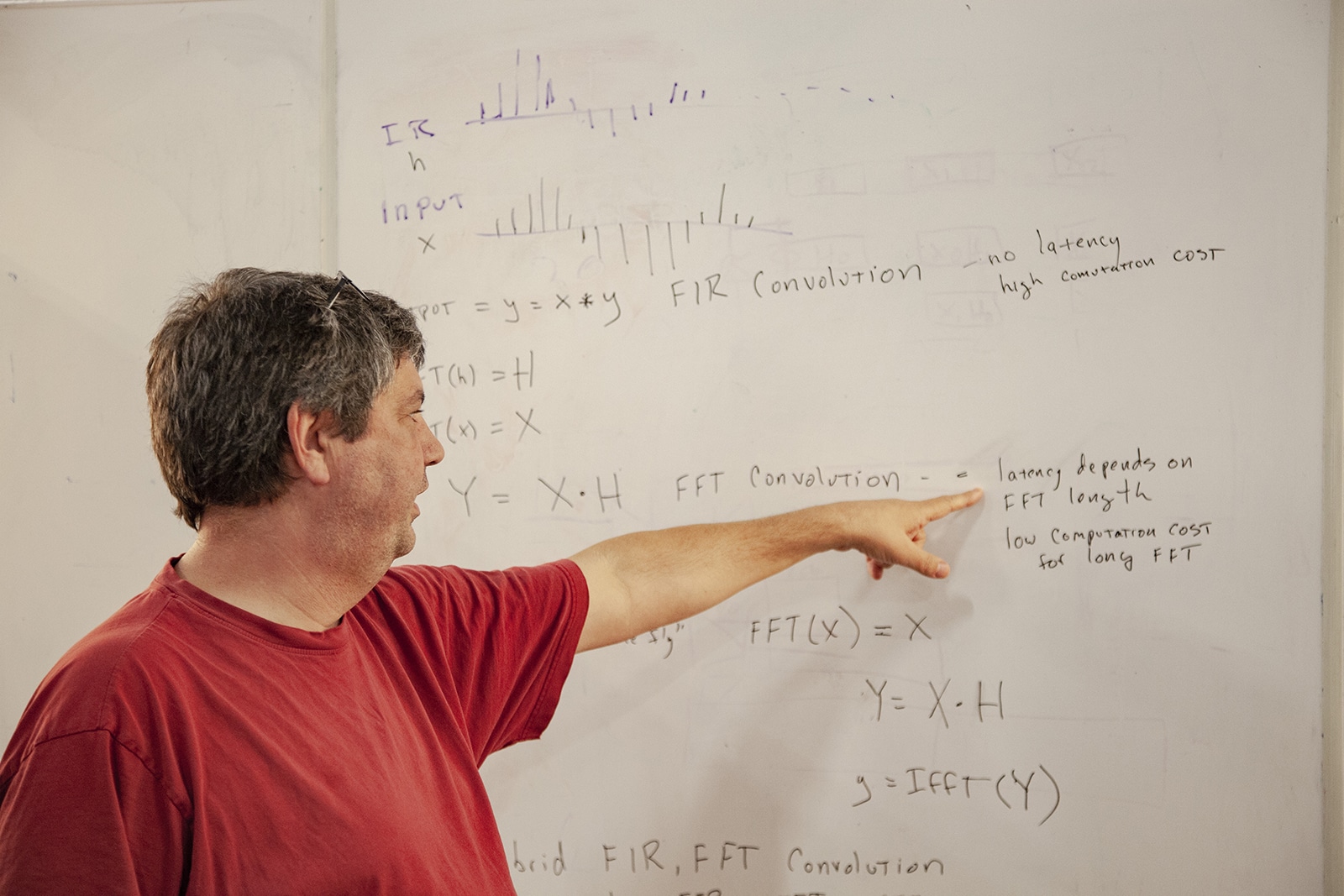
We knew it was theoretically possible to deliver our goal of 24bit 96kHz 500ms impulse responses, but we had to figure out how to do it in practice.
This part of the Iridium project turned out to be a five-year journey through adversity.
We started with a smaller proof-of-concept FFT (fast Fourier transform) based IR convolution with shorter-duration mono cab IRs, kept working on it, and eventually tore it all down and rebuilt so we could deliver the 24bit 96kHz 500ms IR cabs that we’d dreamed of for Iridium.
Hybrid Room Ambience Design
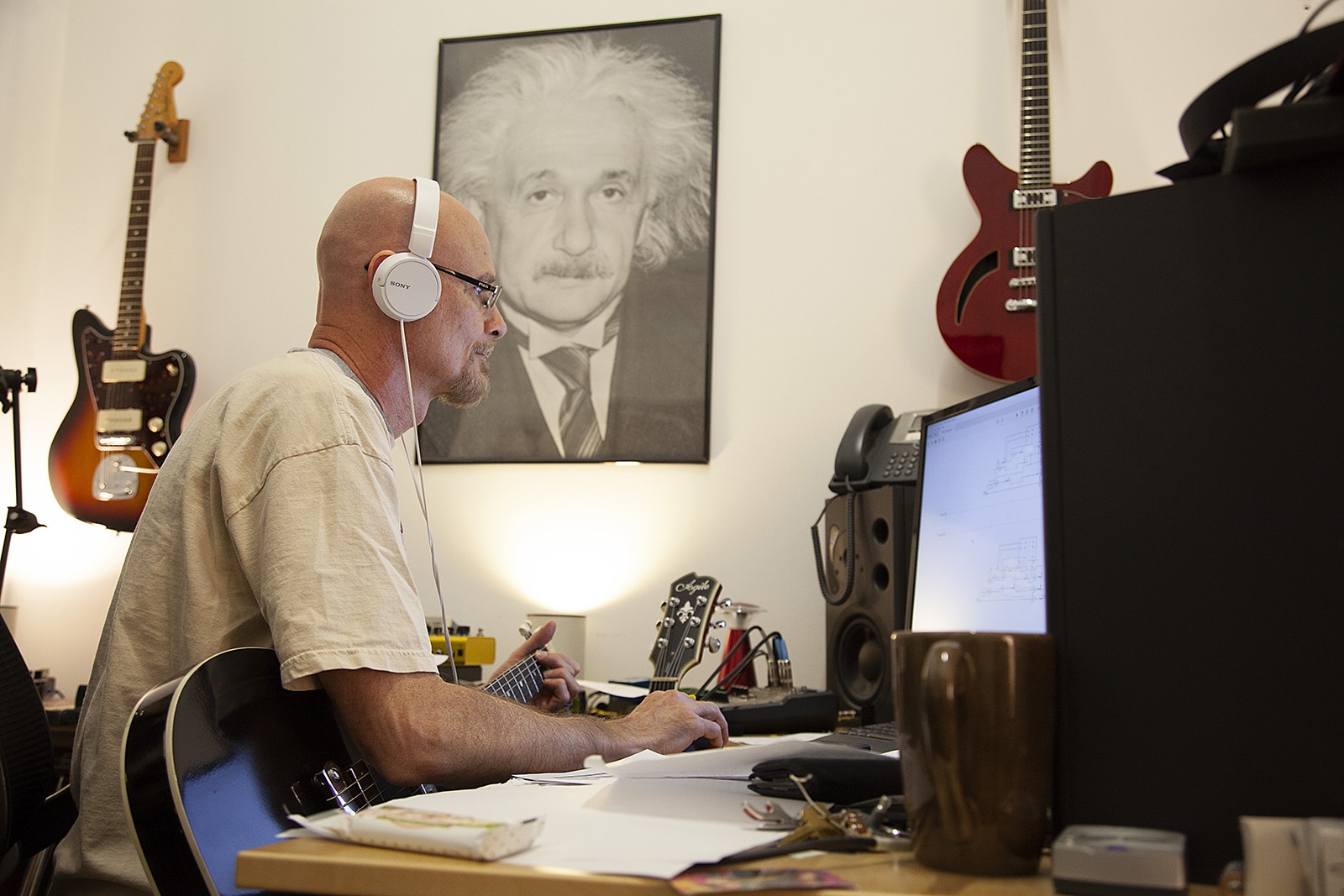
With these amazing amps and cabs, we wanted to create amazing spaces for them to live and breathe in.
When you are playing in a physical room, the first 80 milliseconds or so of early reflections are what really tell your brain what type of space you’re in.
The complexity of those myriad early reflections are very difficult to simulate with an algorithm.
That’s where impulse response technology is the perfect tool for the task.
After a certain duration, however, impulse responses become computationally expensive, and that’s where the algorithm shines: on the long tail.
The algorithmic portions of our room ambience were dialed in for each room, with delay lines tailored to enhance and meld with each specific space and room size. Creating a seamless transition between IR and algorithm was an intensive and artistic process that ultimately resulted in completely natural sounding rooms that feel great to play in and never distract.
SHARC and ARM Co-Processors
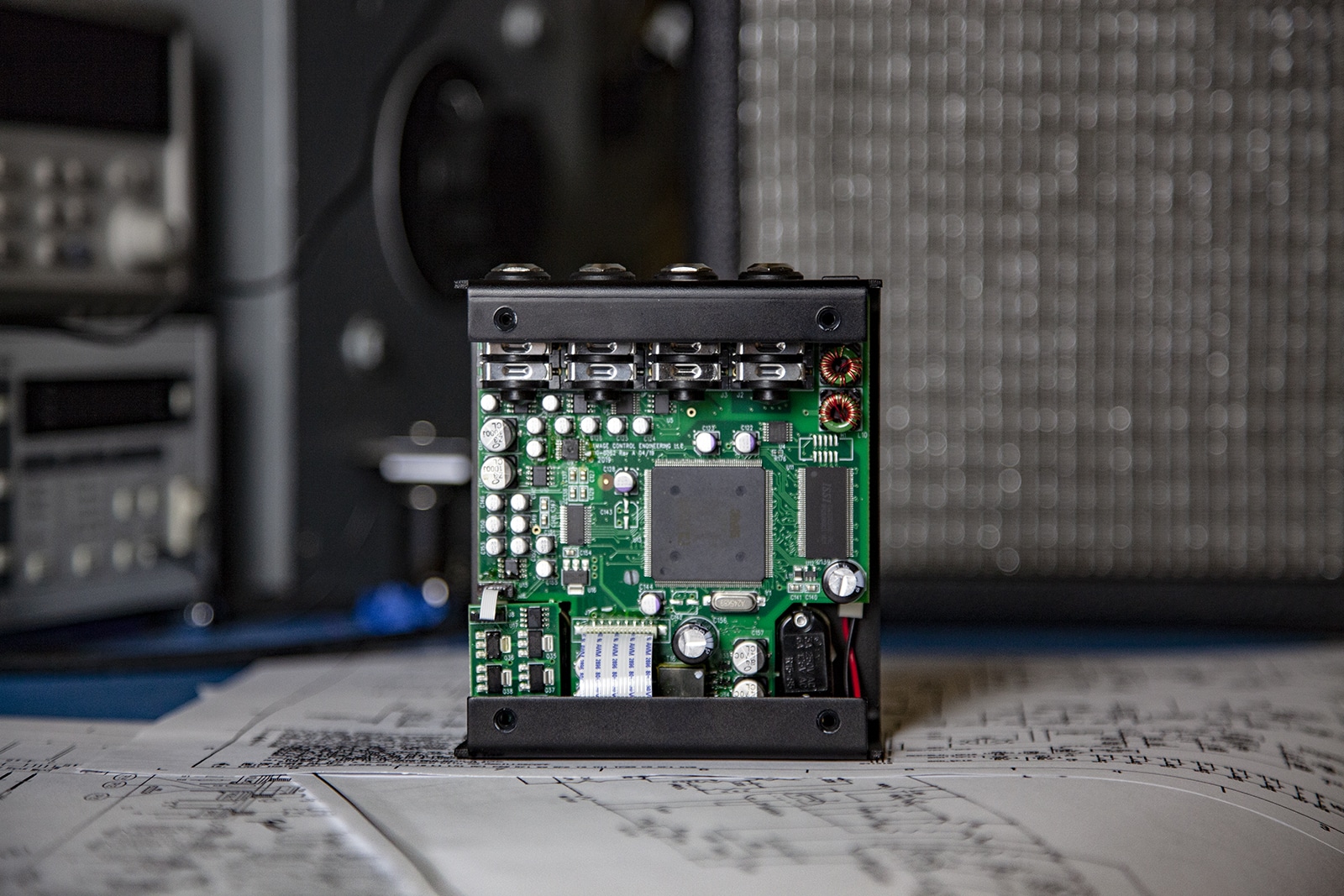
Iridium makes the most of the powerful combination of a high-performance 32-bit floating-point SHARC ADSP-21375 processor working together with an ARM co-processor.
The SHARC is the perfect choice for handling the plethora of FFT instructions Iridium’s real-time sound processing requires, including adding and subtracting simultaneously.
We’ve created an optimized high-speed communications link between the two processors, and have maximized what the ARM co-processor can do.
Each turn of any of Iridium’s knobs sets off a chain of numerous coefficient calculations which we let the ARM co-processor handle, leaving the SHARC free to do its massive computational number crunching full-time at maximum capacity.
Besides stellar sound and responsiveness, this combination delivers super fast patch switching.
The ARM also provides USB connectivity and allows you to very quickly load and audition impulses with our Impulse Manager software.
Iridium is really a new class of device. You get IR resolution never before available in outboard gear, without paying a price in patch switching time, allowing you to select presets seamlessly with the speed you expect for live performance use.
Manufacturing
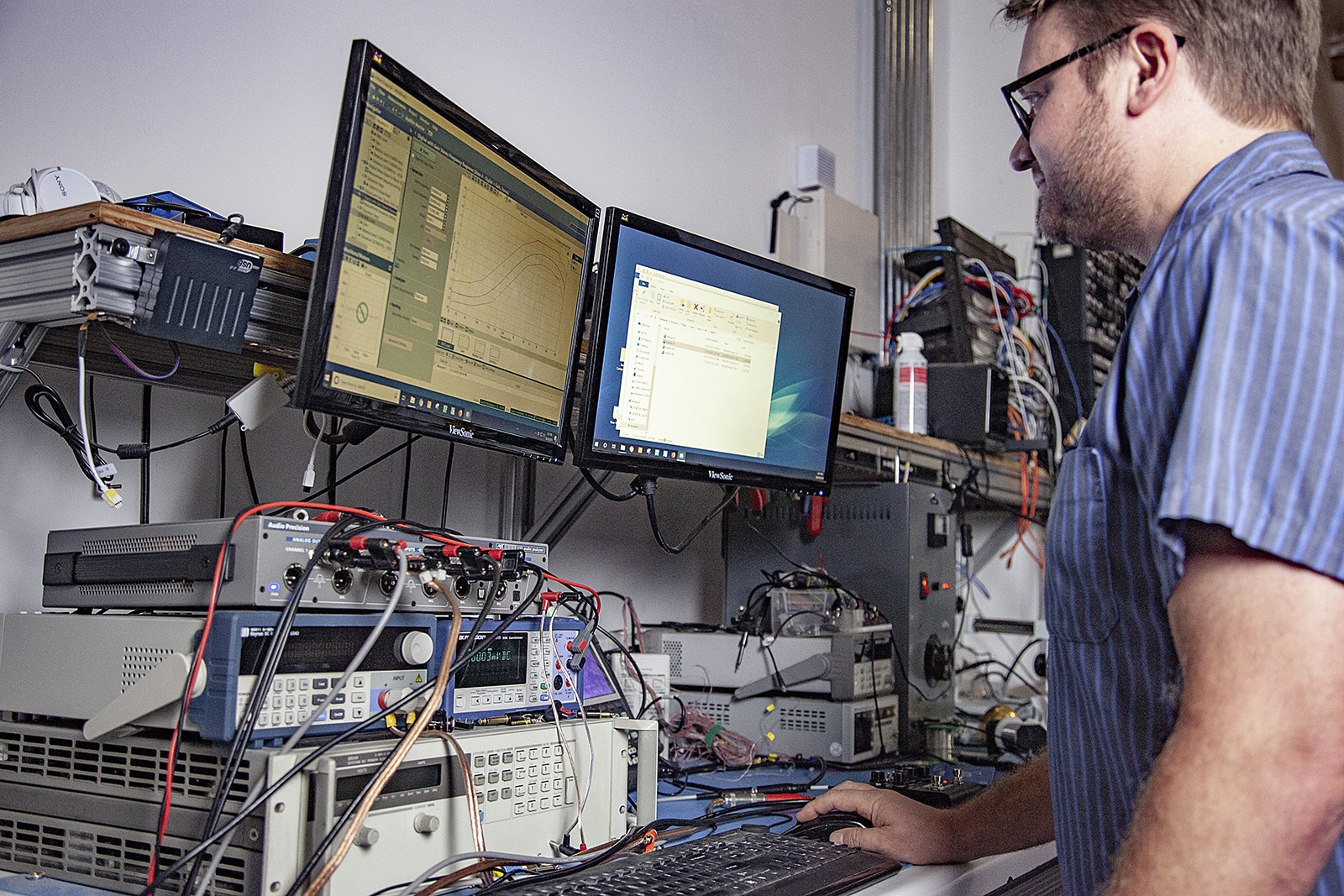
Iridium, like all of our effects pedals, is built right here in Los Angeles, California.
There are many advantages to building our pedals within minutes of our design shop.
Most importantly, we control every aspect of manufacturing to ensure quality and consistency at every step of the process.
Every potentiometer, encoder, switch, LED, and audio component on every pedal is tested and re-tested.
Using the latest Audio Precision audio analyzing gear, each pedal must exceed our exacting audio quality standards.
Specs
Sound Design
-
Three amplifier models crafted using Matrix Modeling™, capturing the subtleties and unique tonal qualities of each amp
- Round Amp – based on* a Fender® Deluxe Reverb®
- Chime Amp – based on* the Brilliant channel of a Vox® AC30
- Punch Amp – based on* a Marshall® Plexi (Super Lead model number 1959)
-
Nine Impulse Response speaker cabinets, 24bit / 96kHz 500ms
Stereo (three per amp type), pre-loaded with a curated set of IRs:- Deluxe Reverb 1×12″ by OwnHammer
- Blues Junior® 1×12″ by CabIR
- Vibrolux® 2×10″ by CabIR
- AC30 2×12″AlNiCo by OwnHammer
- 1×12″ AlNiCo by Celestion®
- Mesa® 4×12″ by Valhallir
- GNR 4×12″ by OwnHammer
- 2×12″ Vintage 30 by Celestion
- Marshall® 8×12″AlNiCo by CabIR
- Load your own impulse responses using Strymon Impulse Manager software
-
Hybrid IR/algorithmic Room control with selectable small, medium, and
large rooms - Simple, responsive amp-style controls for Drive, Level, Bass, Middle,
and Treble - Premium stereo high impedance discrete JFET analog front end with
up to 22dB of pure analog gain
Ins, Outs, and Switches
- Stereo Input (requires TRS adapter cable)
- Stereo Output
- Operates at instrument and Line Level input sources
- Discrete transistor headphone amplifier
- Expression pedal input provides seamless morphing between knob positions (Expression mode), or smooth pre/post volume control with logarithmic taper (Volume mode)
- USB jack for connecting to Strymon Impulse Manager software
to add and edit your own speaker cabinet IRs - Compatible with Strymon MultiSwitch Plus for remote selection of up to 4 presets
- Full featured MIDI control accessible via EXP Jack for remote parameter control and access to 300 preset locations (requires Strymon MIDI EXP cable or MIDI to TRS interface)
Audio Quality
- Ultra-low noise, high performance 24-bit 96kHz A/D and D/A
converters provide uncompromising audio quality - Super high performance SHARC and ARM co-processors
- 32-bit floating point processing
More
- Transparent Analog Buffered Bypass
- Strong and lightweight anodized black aluminum chassis
- 9V DC power supply included
- Power requirements: maximum 9 volts DC center-negative, with a minimum of 500mA of current
- Dimensions:
- 4.5″ deep x 4″ wide x 1.75″ tall
- 11.4 cm deep x 10.2 cm wide x 4.4 cm tall
- Designed and built in the USA




